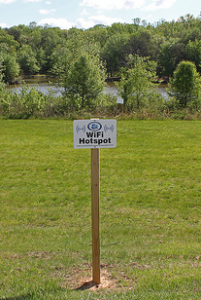Have you noticed this is the first thing each new kid says to you as they walk in the door of your house? The younger ones are clutching their iTouches or iPad Minis, covered in coloured duct tape designs and stickers, tricked out with Rainbow Loom handles ; the teenagers have phones without data packages and full-sized iPads.
 In the end they are all the same: they want the Internet. And we hold the key.
In the end they are all the same: they want the Internet. And we hold the key.
Never mind that it contravenes all established rules of courtesy to bring your own gaming or communication device over to someone else’s place. You are supposed to be playing games or talking or hanging out, no?
No. Not for this generation.
Now they huddle together looking at their own screens, or occasionally each other’s screens. They do things that are inexplicable to adults: snap pictures sent by Snapchat, programmed to self-destruct; watch home-made television shows available only online, play games with no discernible purpose (or even worse) they watch videos of other people playing games.
Their necks are craned, their backs are hunched. It’s too hard for a parent to watch this kind of posture so best to turn away while they are with their friends, and leave them to it for controlled amounts of time. Just when they seem to be mostly ignoring each other, in their own worlds, the digital sound is punctuated by bursts of laughter, excited talking at warp speed, waves and waves of giggles.
I bring out cookies, popcorn, fruit. I bite my tongue for long stretches of time, wanting them to Just Go Outside. They are sweet and earnest when they look up from their screens. They are making a video or posting a short story or Tweeting or blogging or gaming. They are so completely immersed in their semi-shared binary worlds that they don’t even understand that we don’t understand this kind of socialization. They don’t really care anyway.
We weren’t any different; it’s just that our playthings had different names: Sony Walkmen, Atari, Intellivision. Let’s be honest – we would have killed for something like an iPad back when we were 14.
I give out the code, but they need to ask me for it. Face to face. In real time. That’s my small assertion of control. The younger ones get supervision and a timer; the older ones have earned some privacy and leniency.
I listen to them making sense of this new world in their conversations. They have their own code. I wonder if we will ever get it.
 What if your child, an enthusiastic student, suddenly doesn’t want to go to school? Or maybe she or he stops eating lunch or complains that they are the last picked when kids pair up for work in class? For parents, these events can cause worry and concern that a child is being bullied. While not always the case, parents who notice that something doesn’t seem “right” with their child will want to take action. The key is to do it in a way that won’t stigmatize your child or make the situation worse.
What if your child, an enthusiastic student, suddenly doesn’t want to go to school? Or maybe she or he stops eating lunch or complains that they are the last picked when kids pair up for work in class? For parents, these events can cause worry and concern that a child is being bullied. While not always the case, parents who notice that something doesn’t seem “right” with their child will want to take action. The key is to do it in a way that won’t stigmatize your child or make the situation worse.


